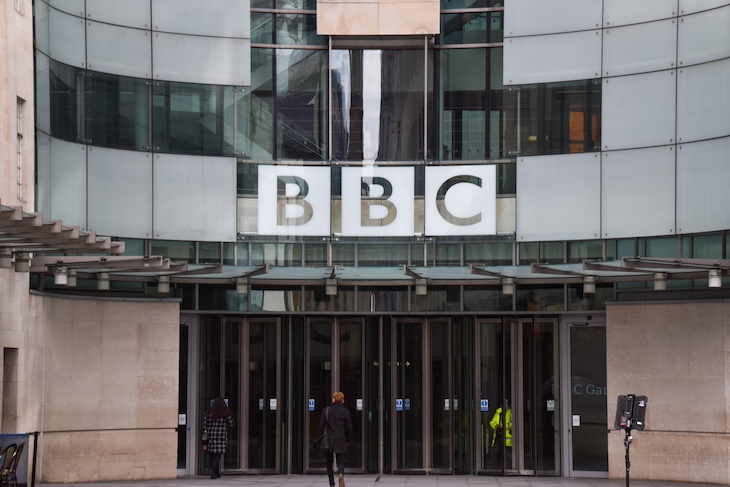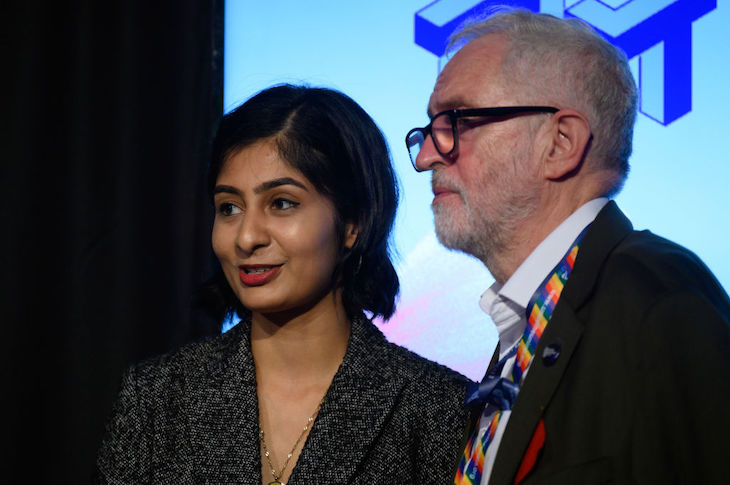It’s not a pleasant feeling to know there are colleagues in your workplace who think you should be summarily dismissed and marched out of the building, flanked by security. Yet I learned this week that this is my predicament.
As reported by GB News, unidentified BBC employees have been trying to identify me and have me fired for writing in The Spectator. According to one staff member, I need ‘IDing and then sacking’. The stated cause of their ire? That I had been, ‘very happy to breach the terms of (my) employment’, by writing articles accusing the BBC of breaching its own rules on impartiality.
Asked about the messages, a BBC spokesperson told The Spectator: ‘We’re not going to comment on the contents of an internal message board, but we have reminded staff of their responsibilities and the rules when using internal apps such as these.’
For my sanctimonious detractors to pose as guardians of contractual small print is laughably disingenuous. The real reason my critics want me gone is that I have dared to break the BBC’s progressive omertà by revealing the extent to which the new religion of trans ideology has taken hold in the newsroom and led to grave editorial lapses.
It’s water off a duck’s back to a jaded hack like me but I wish to state for the record that I harbour no ill will whatsoever towards the trans community and wish its members happy and fulfilling lives. I deplore discrimination as much as the next liberal-minded bloke. However, as a BBC journalist I am professionally obliged to care deeply about critical thinking, biological realities, and the real-world consequences of giving mainstream credibility to deranged dogmas.
My thinking on trans ideology was informed by another witch-hunt target, although the vicious, relentless and concerted campaign of persecution she has faced for years makes my experience risible by comparison. JK Rowling set out her reasons for defending the rights of biological women and girls in an essay published in June 2020. It confounds me to this day that any BBC employee could have read this well-researched article, filled with alarming statistics and prescient warnings, and somehow concluded that the Harry Potter creator was a bigot to be shunned. I can only conclude they didn’t read it, an omission that has unquestionably fuelled the misleading portrayal of Rowling by the BBC as an outlier with hardline views.
It is troubling that this unjust depiction of Rowling as anti-trans, rather than pro-women, may have given cover and comfort to the despicable online trolls who have bombarded her with abuse and death threats. Despite the BBC having to apologise to the author, and audience complaints about her treatment by the BBC being upheld, irreparable damage has been done. As the recent Cass Review revealed, confused teenagers in the hormonal maelstrom of puberty have been treated as sacrificial lambs on the altar of gender extremism.
You might have thought the Cass Review’s disturbing findings would put a check on the BBC’s trans rights proselytising. But, despite a new editorial briefing on reporting sex and gender being issued to BBC journalists in December last year emphasising caution and balance, the early signs of a new approach are inauspicious. Only this month the BBC admitted that it had broken its own accuracy rules by failing to mention in initial reports that sadistic murderer Scarlet Blake was a trans woman, i.e. biologically male. The BBC’s editorial guidelines still say that preferred pronouns should generally be used in reports, so next time a male rapist claims he’s actually a woman and demands to be called ‘she’ and ‘her’, the BBC will presumably comply.
Such concerns are clearly anathema to my judgmentally woke colleagues. They do not seem to consider the possibility that my motivation in speaking out is to save the BBC, not bury it. I believe the BBC is a vital institution, and its demise would only diminish Britain at home and abroad. But when it is impossible to have an open conversation about the issue of sex and gender with colleagues for fear of being reported to HR, is it reasonable to expect me to raise my objections in-house? As I have described here before, I tried this during the pandemic and was met with denial and derision.
Of course, I could have resigned before ‘going public’. That would arguably have been the honourable thing to do. But would it be fair, or right? Why should I make myself unemployed because of the failings of senior BBC editors, who would merely shrug and continue as before? Why should I, a disgruntled licence fee payer as well as a BBC journalist, remove myself voluntarily from the one place I might yet be able to make a difference to the Corporation’s editorial direction? And if I can’t achieve this, at least being inside the BBC gives me valuable insights that I can share with the wider public. Quitting on principle would be a Pyrrhic victory in any case. BBC News would have one less journalist who still believes genuinely balanced journalism is not the same as reflecting the progressive values of university-educated metropolitan employees.
So, I plan to stay put. Let the BBC witch-hunters patrol the online chat rooms. And seeing as they have taken an interest in my writings here, permit me to address them directly. If your hackles are raised by journalists who are ‘very happy to breach their contracts’ then take a good look in the mirror. You signed up to be impartial but your refusal to leave your fashionable socio-political views at home betrays the licence fee payers who fund your wages. The BBC has made a bargain that it will report without fear or favour in return for public funding and it is you, not I, who has broken that promise.
Our opinions should have no bearing on our work. We shouldn’t put a spin on our reports, or add speculative commentary, or present what we believe as the consensus viewpoint without incontrovertible evidence. What should take precedence are the provable facts. We should report what is certain, be honest about what we don’t know, and respect our audiences enough to let them draw their own conclusions.
This is all I want – genuine accuracy and impartiality. If that is a sackable offence, then I’m afraid the BBC is already finished.







Comments